
Curtis Hidden Page (April 4, 1870 [1] -December 13, 1946 [2] ) was a United States educator and writer.

Curtis Hidden Page (April 4, 1870 [1] -December 13, 1946 [2] ) was a United States educator and writer.
He was born in Greenwood, Missouri. He graduated from Harvard University, where in 1890 he became the first recipient of the George B. Sohier Prize for literature. He held teaching positions in French and English at Harvard University (1893–1908), Columbia University (1908–1909), Northwestern University (professor of English literature, 1909–1911), and Dartmouth College (professor of English literature, 1911–1946). [3]
Page was elected to the New Hampshire state legislature in 1933 and again in 1939. [3]
Compiler of anthologies of verse such as British Poets of the Nineteenth Century and The Chief American Poets, [1] Page also published verses, essays, and stories in numerous periodicals. In 1906, writing of his activities to his fellow Harvard alumni, he stated: "I have two volumes of verse nearly ready, but find little time to give to completing them and doubt if they will be published until after I am dead!" [4]
Page also translated many French works, including A Voyage to the Moon, by Cyrano de Bergerac and The Man Who Married a Dumb Wife by Anatole France. He published a well-regarded [5] translation of eight plays by Molière in 1908; of these, Tartuffe, or the Hypocrite is available online from Project Gutenberg.

Jean-Baptiste Poquelin, known by his stage name Molière, was a French playwright, actor, and poet, widely regarded as one of the great writers in the French language and world literature. His extant works include comedies, farces, tragicomedies, comédie-ballets, and more. His plays have been translated into every major living language and are performed at the Comédie-Française more often than those of any other playwright today. His influence is such that the French language is often referred to as the "language of Molière".
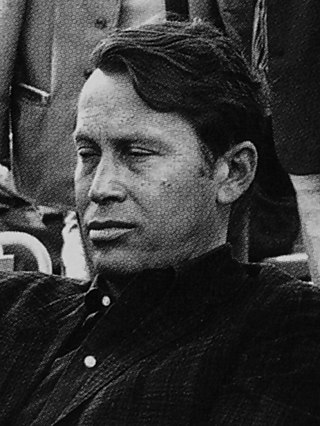
Richard Purdy Wilbur was an American poet and literary translator. One of the foremost poets, along with his friend Anthony Hecht, of the World War II generation, Wilbur's work, often employing rhyme, and composed primarily in traditional forms, was marked by its wit, charm, and gentlemanly elegance. He was acclaimed in his youth as the heir to Robert Frost, translated the verse dramas of Moliere, Corneille, and Racine into rhymed English, collaborated with Leonard Bernstein as the lyricist for the opera Candide, and in his old age acted, particularly through his role in the annual West Chester University Poetry Conference, as a mentor to the younger poets of the New Formalist movement. He was appointed the second Poet Laureate Consultant in Poetry to the Library of Congress in 1987 and received the Pulitzer Prize for Poetry twice, in 1957 and 1989.
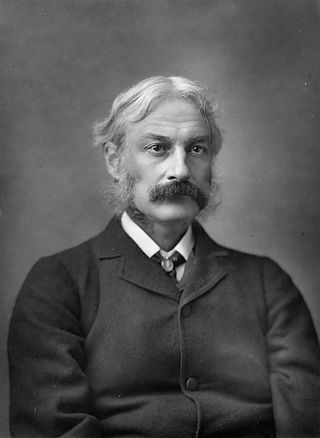
Andrew Lang was a Scottish poet, novelist, literary critic, and contributor to the field of anthropology. He is best known as a collector of folk and fairy tales. The Andrew Lang lectures at the University of St Andrews are named after him.

Arthur William Symons was a British poet, critic, translator and magazine editor.
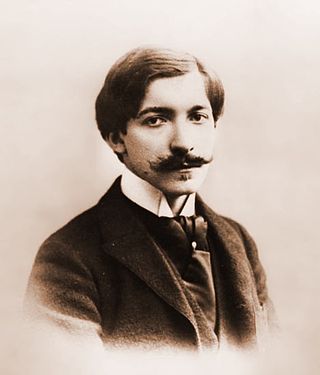
Pierre-Félix Louÿs was a Belgian poet and writer, most renowned for lesbian and classical themes in some of his writings. He is known as a writer who sought to "express pagan sensuality with stylistic perfection". He was made first a Chevalier and then an Officer of the Légion d'honneur for his contributions to French literature.

William Vaughn Moody was an American dramatist and poet. Moody was author of The Great Divide, first presented under the title of The Sabine Woman at the Garrick Theatre in Chicago on April 12, 1906, and then on Broadway at the Princess Theatre, running for 238 performances from October 3, 1906, to March 24, 1907. His poetic dramas are The Masque of Judgment (1900), The Fire Bringer (1904), and The Death of Eve. His best-known poem is "An Ode in Time of Hesitation," on the Spanish-American War; others include "Gloucester Moor," "On a Soldier Fallen in the Philippines," "The Brute," "Harmonics", "Until the Troubling of the Waters," "The Departure," "How the Mead-Slave Was Set Free," "The Daguerreotype," and "The Death of Eve." His poems everywhere bespeak the social conscience of the progressive era (1893–1916) in which he spent his foreshortened life. In style they evoke a mastery of the verse-craft of his time and also the reach and depth derived from his intensive studies of Milton and of Greek tragedy.
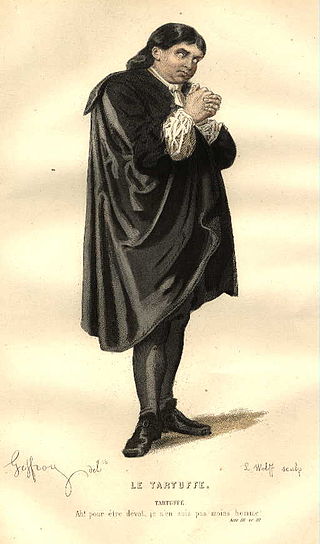
Tartuffe, or The Impostor, or The Hypocrite, first performed in 1664, is a theatrical comedy by Molière. The characters of Tartuffe, Elmire, and Orgon are considered among the greatest classical theatre roles.
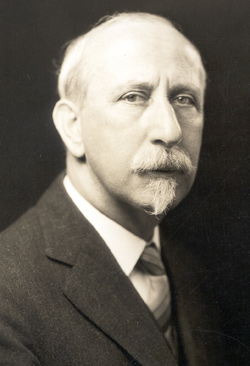
William Allan Neilson was a Scottish-American educator, writer and lexicographer, graduated in the University of Edinburgh in 1891 and became a PhD in Harvard University in 1898. He was president of Smith College between 1917 and 1939.

Van Wyck Brooks was an American literary critic, biographer, and historian.
James Fitzmaurice-Kelly FBA was a British writer on Spanish literature.

Thomas Raynesford Lounsbury was an American literary historian and critic. He was born in Ovid, New York on January 1, 1838. He graduated from Yale College in 1859 with a B.A. and received a M.A. from Yale University in 1887. He later received honorary degrees from Yale University, Harvard University, Lafayette College, Princeton University, and Aberdeen College. He enlisted in the 126th New York Volunteers in 1862 and served in the Civil War as a first lieutenant.
Raymond Macdonald Alden was an American scholar and educator.
Oliver Elton, FBA was an English literary scholar whose works include A Survey of English Literature (1730–1880) in six volumes, criticism, biography, and translations from several languages including Icelandic and Russian. He was King Alfred Professor of English at Liverpool University. He also helped set up the Department of English at the University of the Punjab, Lahore, Pakistan.
William Ellery Leonard was an American poet, playwright, translator, and literary scholar.

François de La Mothe Le Vayer, was a French writer who was known to use the pseudonym Orosius Tubero. He was admitted to the Académie française in 1639, and was the tutor of Louis XIV.

John Henry Wright was an American classical scholar born at Urumiah (Rezaieh), Persia. He earned his Bachelors (1873) and Masters (1876) at Dartmouth College, New Hampshire. After junior appointments in 1886 he joined Johns Hopkins as a professor of classical philology. In 1887, he became a professor of Greek at Harvard, where, from 1895 to 1908, he was also Dean of the Graduate School of Arts and Sciences.
Ranjit Bolt OBE is a British playwright and translator. He was born in Manchester of Anglo-Indian parents and is the nephew of playwright and screenwriter Robert Bolt. His father is literary critic Sydney Bolt, author of several books including A preface to James Joyce, and his mother has worked as a teacher of English.
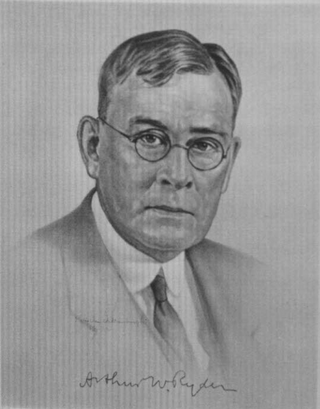
Arthur William Ryder was a professor of Sanskrit at the University of California, Berkeley. He is best known for translating a number of Sanskrit works into English, including the Panchatantra and the Bhagavad Gita.

Contact between Geoffrey Chaucer and the Italian humanists Petrarch or Boccaccio has been proposed by scholars for centuries. More recent scholarship tends to discount these earlier speculations because of lack of evidence. As Leonard Koff remarks, the story of their meeting is "a 'tydying' worthy of Chaucer himself".

Fred Lewis Pattee was an American author and scholar of American literature. As a professor of American literature at the Pennsylvania State University, Pattee wrote the lyrics of the Penn State Alma Mater. Pattee is sometimes labeled the "first Professor of American Literature", a position he held at Penn State from 1895 until 1928.